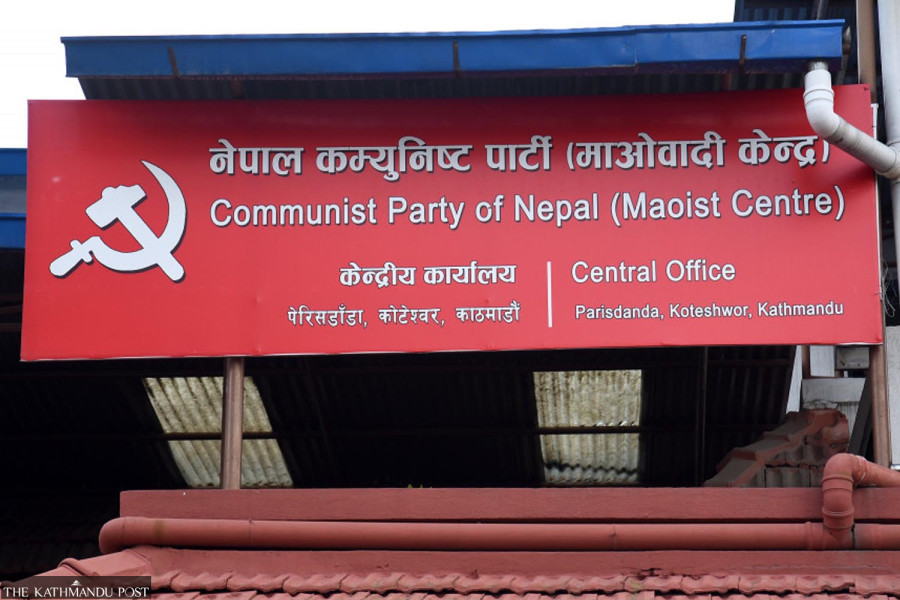Politics
Agreement to end House deadlock creates discord in Maoist Centre
Maoist chair Dahal defends deal as senior vice-chair Shrestha, other leaders criticise it.
Purushottam Poudel
The CPN (Maoist Centre)’s decision to sign a two-point agreement with the ruling the Nepali Congress and CPN-UML with the goal of ending the two-week-long obstruction of the House of Representatives has triggered a dispute within the main opposition party.
Several Maoist leaders including Senior Vice-chair Narayankaji Shrestha have criticised the agreement though it helped with the House resumption on Friday. They termed it premature and lacking in strategy.
The opposition parties began House obstruction demanding Home Minister Ramesh Lekhak’s resignation, linking him to the visit visa scam at the Tribhuvan International Airport immigration.
Later, the Maoist Centre softened its stance and asked the government to form a committee to investigate the matter.
On Friday, however, two opposition parties—the Maoist Centre and the CPN (Unified Socialist)—agreed to end the House deadlock after the ruling parties’ commitment to conduct a study and address the issue through legal, policy and structural measures.
While the Maoist leadership, including chair Pushpa Kamal Dahal, defended the agreement, describing it as essential to advance crucial legislative agendas, many in the party argued that it undermined their stance on accountability and good governance.
The federal parliament had been obstructed since May 27 after the opposition, chiefly the Maoist Centre, demanded Home Minister Lekhak’s resignation alleging that human trafficking was taking place under the guise of visit visas, in collusion with immigration officials. Opposition lawmakers also claimed that even officials from Lekhak’s secretariat were linked to the crime.
On Saturday, Maoist leader Shrestha said that the agreement with the ruling coalition should be reviewed to determine whether it serves the Maoist Centre’s interests.
“You all must have seen what happened in Parliament yesterday,” Shrestha said, addressing an event organised by the Dolakha-Kathmandu Coordination Committee of the Maoist Centre on Saturday. “The House resumed following a two-point agreement but it has invited reactions. There should be a review to determine whether it [the deal] benefits our party and supports the campaign for good governance.”
Also, Lekhnath Neupane, a vocal leader in the Maoist Centre, questioned the agreement, describing it as “completely immature”.
“What exactly is in the agreement that the Maoist Centre signed? Wouldn’t it have been better had we simply issued a verbal statement saying we were suspending the protest?” Neupane raised a question. “The party’s decision to sign the two-point agreement with the ruling parties to open the House is completely immature.”
On May 22, the Commission for Investigation of Abuse of Authority (CIAA) raided the Tribhuvan International Airport Immigration Office following complaints of visit visa misuse.
Lekhak has been dragged into controversy after the constitutional anti-graft body detained the immigration office’s chief, Tirtharaj Bhattarai, a joint-secretary under the home ministry, and seized vital documents.
Following Bhattarai’s arrest, the anti-graft body has also begun investigating staff from the home minister’s secretariat, prompting opposition lawmakers to raise questions about Lekhak’s moral responsibility.
The anti-graft body claims to have uncovered evidence that individuals were sent abroad on visit visas in exchange for large sums of money, in collusion with officials including Bhattarai. Bhattarai’s transfer to the home ministry while under investigation has fuelled suspicions of higher authorities’ involvement in the scam.
Though CPN-UML Chief Whip Mahesh Bartaula, on behalf of the ruling parties, and Maoist Centre Chief Whip Hit Raj Pandey from the opposition, signed the two-point agreement, not all opposition parties agree to it.
The Rastriya Swatantra Party (RSP), and the Rastriya Prajantra Party (RPP), the fourth and fifth largest parties in the House of Representatives, respectively, have rejected the deal. The Unified Socialist however backed the Maoist Centre in its move to end the deadlock.
Speaker Dev Raj Ghimire conducted the House meeting on Friday amid the chanting of slogans by the RSP lawmakers.
The agreement states that the government would help the CIAA carry out the investigation, as and when needed.
Additionally, the government has pledged to conduct a comprehensive study and investigation of longstanding issues related to immigration and visit visas, and to take concrete steps towards appropriate policy, legal, and structural reforms.
When various party leaders questioned the agreement, Maoist Centre chair Dahal, on Saturday, claimed that they had reached the agreement only after the government committed to investigate the visit visa scandal.
Addressing a convention of indigenous organisations affiliated to the Maoist Centre in Jhapa, he stated that if the Maoist party had continued the obstruction, the passage of several pending bills in Parliament would have been delayed.
“The federal civil service bill, which was drafted with great effort during my premiership, is now on the verge of being passed,” Dahal said. “If the Maoist Centre were to obstruct Parliament indefinitely, it would mean preventing the bill’s passage, as well as the passage of the education bill, the citizenship bill, and the resolution of matters related to the peace process.”
Devendra Paudel, a party secretary of the Maoist Centre, denies any rift in the party over the two-point agreement. Paudel said the whole party is on the same page on ending the House deadlock.
“But allowing for Parliament to reopen does not mean we have backtracked on our stance on the visit visa scam,” he said.
“The prime minister’s party, UML, and the government have promised to address within a month our concerns over the visit visa. If they do not abide by this promise, we will again protest against the government,” Paudel added.
Analyst of Nepal’s left politics, Khangendra Prasai, said that for the time being he would trust the Maoist Centre chair Dahal. “As an ordinary citizen, what matters to me now is that Parliament is functioning again,” Prasai said. “A stalled House is no solution to any problem.”




 10.12°C Kathmandu
10.12°C Kathmandu















